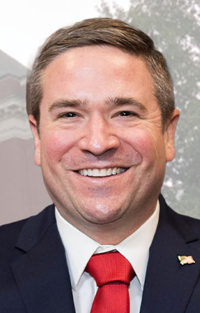
Trump
JEFFERSON CITY — Missouri Attorney General Andrew Bailey has launched an investigation into major tech companies over concerns that their artificial intelligence chatbots are generating politically biased and factually incorrect responses, particularly about President Donald Trump.

Bailey
In formal demand letters sent to OpenAI, Google, Microsoft and Meta, Bailey accuses the companies of promoting distorted historical narratives under the guise of neutrality, in potential violation of Missouri law.
“We must aggressively push back against this new wave of censorship targeted at our President,” said Bailey in a statement. “Missourians deserve the truth, not AI-generated propaganda masquerading as fact. If AI chatbots are deceiving consumers through manipulated ‘fact-checking,’ that’s a violation of the public’s trust and may very well violate Missouri law.”
Bailey’s action stems from a series of responses provided by AI chatbots — including OpenAI’s ChatGPT, Meta AI, Microsoft Copilot and Google’s Gemini — when asked to rank the last five U.S. presidents based on their records regarding antisemitism.
Several of the chatbots, including ChatGPT, ranked Donald Trump last, a result Bailey’s office called “deeply misleading” and inconsistent with Trump’s record on Israel and Jewish issues.
Citing specific policy decisions such as the relocation of the U.S. Embassy to Jerusalem and the signing of the Abraham Accords, Bailey argues that Trump’s record demonstrates a strong commitment to Jewish interests and Israel.
In letters addressed to Google CEO Sundar Pichai, Meta CEO Mark Zuckerberg, Microsoft CEO Satya Nadella and OpenAI CEO Sam Altman, Bailey questioned how chatbots “supposedly trained to work with objective facts could arrive at such a conclusion.”
The letters also criticized the broader role of Big Tech in shaping public discourse.
Quoting Mark Twain — “Get your facts first, then you can distort them as you please” — Bailey suggested that Twain’s warning had found new relevance in the era of artificial intelligence.
“Factual distortion is now being modernized by the use of AI,” each letter states, adding that AI chatbots have become “the latest demonstration of Big Tech’s seeming inability to arrive at the truth.”
Bailey tied the current investigation to his office’s earlier legal efforts, including the 2022 case Missouri vs. Biden, which alleged unconstitutional collusion between federal officials and social media platforms to censor disfavored viewpoints.
Bailey argues that the AI issue represents a continuation of that same pattern—only now, the mechanisms of censorship are embedded in automated systems rather than human moderators.
The demand letters cite the Missouri Merchandising Practices Act (MMPA), which gives the Bailey authority to investigate deceptive business practices affecting Missouri consumers.
Bailey’s office argues that AI-generated answers, when falsely advertised as neutral and fact-based, may qualify as consumer deception under the MMPA. The letter also raises questions about the companies’ eligibility for federal “safe harbor” protections, which are generally reserved for platforms that host, but do not create, content.
Bailey is seeking documentation from the companies on a range of issues, including internal policies on political bias in algorithmic outputs, how training data is selected and prioritized, and any communications that might explain why Trump was ranked unfavorably in certain AI responses.
The letters each demand “all documents and communications” related to the algorithms’ design and rationale, particularly those tied to the portrayal of Trump and foundational aspects of American history.
The Attorney General’s office noted that it expects voluntary compliance but noted that failure to respond could result in further legal action.
“Given the millions of dollars these companies make annually from Missourians, their activities fall squarely within my authority to protect consumers from fraud and false advertising,” Bailey stated in each letter. “We will not allow AI to become just another tool for manipulation.”
Bailey’s office has requested responses within 30 days of the letters, which were sent via mail to each company. The investigation is being framed as part of a broader campaign to protect free speech, ensure fairness in AI, and hold technology companies accountable for how they present information to the public.








